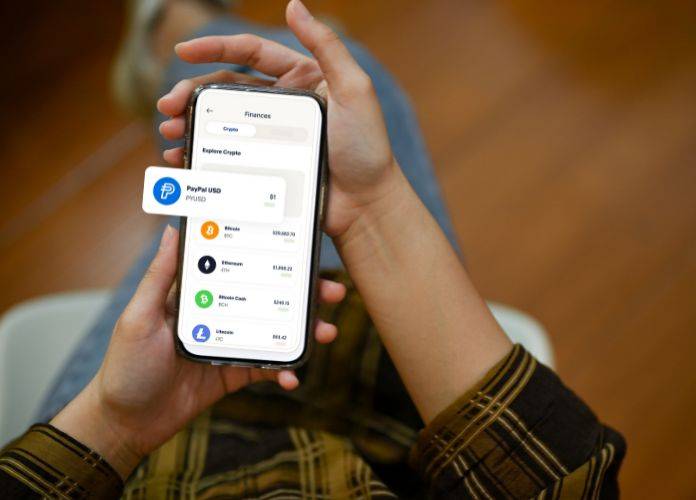In a move set to shake up the crypto payments sector, Paypal has launched its own stablecoin – PYUSD.
A stablecoin is a type of digital currency that is pegged to an asset, such as the US dollar, to maintain a stable value. Stablecoins are often used by traders to move funds between crypto exchanges, or by consumers to make payments in virtual environments.
The latest entrant to the stablecoin market is PayPal USD (PYUSD), launched by PayPal, the global payments giant, on August 8, 2023.
PYUSD is arguably the first dollar-backed stablecoin from a major US financial institution, and it aims to transform payments in Web3 and ‘digitally native’ settings.
In this article, we explain what PYUSD is, how it works, and why it matters for the future of digital payments.
What is PYUSD?
PYUSD is a stablecoin that is issued by Paxos Trust Company, a regulated entity that also issues other stablecoins such as BUSD and PAX. PYUSD is backed by US dollar deposits, short-term US Treasuries, and similar cash equivalents, which are held in reserve by Paxos. PYUSD is designed to be redeemable for US dollars at all times, at a 1:1 ratio, on PayPal’s network.
PYUSD can also be exchanged for other cryptocurrencies that are available on PayPal’s platform, such as Bitcoin, Ethereum, Litecoin, and Bitcoin Cash. PYUSD can be used to fund purchases on PayPal’s network, and it will soon be available on Venmo, PayPal’s popular payments app. Users will also be able to send their PYUSD holdings between a PayPal and a Venmo wallet.
Additionally, PYUSD can be moved to compatible third-party wallets outside of PayPal’s network, such as MetaMask or Coinbase Wallet. This allows users to access other web3 applications and services that accept PYUSD or other stablecoins. Read the PYUSD whitepaper here.
How does PYUSD work?
To use PYUSD, users need to have a PayPal account that is verified and eligible for crypto services. Users can buy PYUSD with US dollars or other fiat currencies on PayPal’s app or website. Users can also sell PYUSD for US dollars or other fiat currencies on PayPal’s platform.
When users buy or sell PYUSD on PayPal’s platform, they pay a transaction fee that varies depending on the amount and the payment method. For example, if users buy $100 worth of PYUSD with a bank account or debit card, they pay a fee of $0.50. If they use a credit card, they pay a fee of $2.90. If they sell $100 worth of PYUSD for US dollars, they pay a fee of $0.30.
When users transfer PYUSD to or from third-party wallets, they pay a network fee that depends on the congestion and demand on the Ethereum blockchain, which is where PYUSD runs. For example, as of August 9, 2023, the average network fee for transferring PYUSD was about $5.50.
Why does PYUSD matter?
PYUSD is an important milestone for the adoption and innovation of digital currencies. It is the first stablecoin from a global payments company that has over 435 million users and millions of merchants worldwide. It also leverages PayPal’s existing infrastructure and compliance standards to provide a secure and convenient way to access the crypto ecosystem.
PYUSD has several potential benefits for users and developers. For users, PYUSD can offer:
– Lower costs: Compared to traditional payment methods such as wire transfers or credit cards, PYUSD can reduce fees and exchange rates for cross-border transactions.
– Faster speeds: Compared to traditional payment methods that can take days or weeks to settle, PYUSD can enable near-instant transfers and settlements.
– More choices: Compared to traditional payment methods that may have limited availability or acceptance in some regions or platforms, PYUSD can offer more options and flexibility for users to pay or get paid in different environments.
– More opportunities: Compared to traditional payment methods that may have limited functionality or utility beyond payments, PYUSD can open up new possibilities for users to access web3 applications and services that offer various benefits such as rewards, incentives, governance, or ownership.
For developers, PYUSD can offer:
– More reach: Compared to other stablecoins that may have limited distribution or awareness among mainstream users or merchants, PYUSD can tap into PayPal’s large and diverse customer base and network.
– More trust: Compared to other stablecoins that may have uncertain regulatory status or transparency issues regarding their reserves or operations, PYUSD can leverage PayPal’s reputation and compliance as a regulated entity that adheres to high standards of security and accountability.
– More support: Compared to other stablecoins that may have limited integration or compatibility with existing platforms or tools, PYUSD can benefit from PayPal’s expertise and resources in providing technical assistance and customer service.
Conclusion
PYUSD is a new stablecoin that is backed by US dollars and issued by PayPal, the global payments giant. PYUSD aims to transform payments in web3 and digitally native settings, by offering users and developers a secure, convenient, and innovative way to access the crypto ecosystem.
PYUSD is redeemable for US dollars at all times, and it can also be exchanged for other cryptocurrencies on PayPal’s platform. PYUSD can be used to fund purchases on PayPal’s network, and it will soon be available on Venmo. PYUSD can also be moved to compatible third-party wallets outside of PayPal’s network, to access other web3 applications and services that accept PYUSD or other stablecoins.
Check current stablecoin interest rates here.







